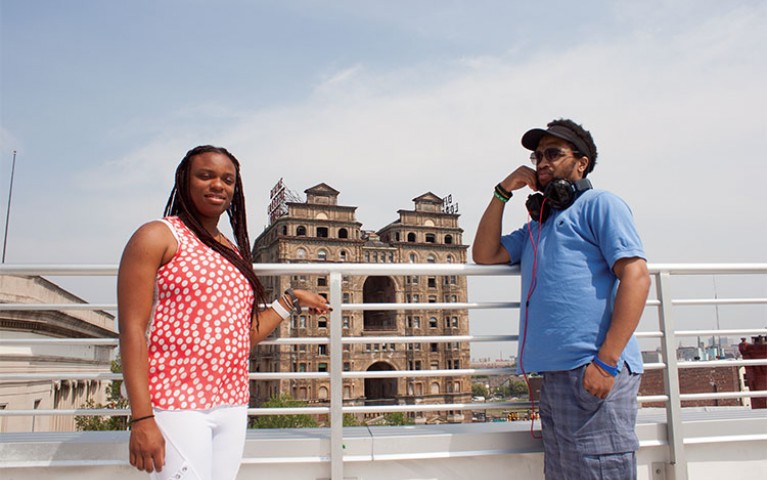Living on the Edge

This story originally appeared in our summer edition of News from HOME.
Kaizer Roberts was floored when he walked into the San Diego conference focused on youth homelessness. “I was shocked at the number of people working for young people. I grew up in a place where nobody cared about you. Nobody wanted to see you succeed. To see so many people ready to help young people like me get to the next level was mind-blowing.”
Nationwide, young adults (ages 18-25) comprise one of the fastest growing groups of persons who are homeless. Kaizer, age 23 and a participant in our young adult pilot program for the past year, understands the terrain from the inside out.
Many of these young adults are transitioning from foster care, juvenile justice, or residential treatment facilities. Others have fled abusive homes, including a disproportionate number who are LGBTQ.
These young people do not match typical “homeless” profiles. The vast majority do not self identify as “homeless.” Many never enter the shelter system or live on the streets, relying instead on “couch surfing"—moving from relative to friend with no permanent housing. “They may wear the freshest clothes out there, or have a hot girl on their arm,” says Kaizer. “They don’t consider themselves homeless because they sleep on someone’s couch. But the reality is, they are.”
These young people may connect and travel together, sleep occasionally in abandoned buildings or on the street, and work marginal jobs, if they have work at all. In Philadelphia, where a 26 percent poverty rate makes it the poorest large city in the country, the symptoms of poverty hit these young people first. They are the product of poorly-performing and under-funded schools. They usually work low-wage, often part-time jobs with no benefits. If they were to apply for affordable public housing, they would face a ten-year wait.
They are the living faces of a new economic reality in this country, marked by an increasing wealth disparity which allows workers to work full-time yet still not be paid enough to afford stable housing. Often they do not have a high-school diploma or skills, and are not able to support themselves.
Yet not all the barriers they face are structural. “I often want to tell young people: ‘Swallow your pride. Work with your parents,’” reflects Kaizer. “Many young people go homeless because they think they are grown, and they want to be independent but are not in a place to do that. They reject structure and rules—including programs that have these. Unless parents are destructive and abusive, work with them. I wish I’d had that mindset.”
We believe that with interventions to stabilize, educate, employ, and empower these young adults, we can prevent them from cycling into the homeless system. More than a year ago, we launched a pilot project supporting eight young people at JBJ Soul Homes. This Young Adult Program, a strategic component of MPOWER, has been developed with lead funding by Leigh and John Middleton, the JBJ Soul Foundation, and the Neubauer Catalyst for Young Adults.
Participants in the program are between 18 and 24, employed full-time, or employed part-time and in school. Their rent is capped at 30 percent of their income. Young adults set personal goals and meet with case managers often. They get support in budgeting, life skills, and health maintenance.
Even with housing and support, life is not easy for young adults. Kaizer spent three years commuting four hours a day to retail jobs at suburban stores before getting a position in the city. He works nights so he has the chance to add in some school.
One year later, however, all the young people who joined this pilot project are still part of the program. One has graduated from school and is living independently. Others are working on their goals, hoping to achieve full independence in the upcoming year.
Project HOME currently houses 26 young adults, (including the eight in our young adult program). Over the next five years, with the leadership of Mel Heifitz, Duane Perry, and Arthur Kaplan, we plan to increase housing and support services, including programming focused on the specific concerns of LGBTQ youth.
In his spare time, Kaizer is dreaming of a new project. “I want to create a circle of care for people who are homeless. I want to take them to lunch, listen to their story, ask them what would help them. I want to pay it forward.”
With grateful thanks to all of the funders of the Young Adult Program: Leigh and John Middleton; JBJ Soul Foundation; the Neubauer Catalyst for Young Adults; Duane Perry and Arthur Kaplan; John Alchin; Haines Foundation; Mel Heifitz; and the Vert Charitable Trust. More about the housing crisis many young adults face.